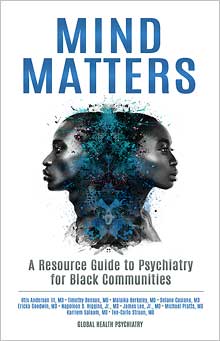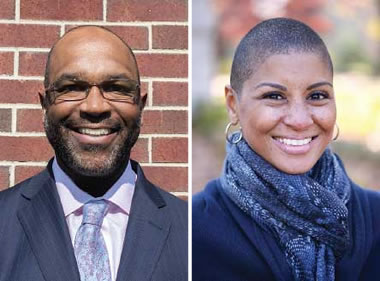As we wrote the book, the person we had in mind is your grandmother,” said psychiatrist Napoleon Higgins, M.D., describing the intent behind Mind Matters: A Resource Guide to Psychiatry for Black Communities.
Published this year by Global Health Psychiatry, the 175-page book is a unique contribution to the psychiatric literature for lay people: a resource guide about mental health in the African-American community.
Higgins is CEO of Global Health Psychiatry. He is one of 10 African-American psychiatrists, all board members of Global Health Psychiatry, who began the project two years ago to describe the major DSM-5 diagnoses in easy-to-understand language.
Higgins and his fellow authors who spoke with Psychiatric News say the resource guide is intended to fill a gap left by the plethora of texts written overtly for experts. “Too often books about psychiatry and mental health—even when they are intended for lay audiences—are really written for other professionals,” Higgins said. “We wanted to demystify the language of psychiatry.”
His fellow authors are Otis Anderson III, M.D., a community psychiatrist in Southaven, Miss.; Timothy G. Benson, M.D., assistant medical director of the NBA/NBPA Player Assistance/Anti-Drug Program in Los Angeles; Malaika Berkeley, M.D., a private practitioner in Atlanta; Delane Casiano, M.D., a community psychiatrist in Philadelphia; Ericka Goodwin, M.D., a child and adult psychiatrist based in Atlanta; James Lee Jr., M.D., president and CEO of Ascension Behavioral Healthcare in Rock Hill, S.C.; Michel Pratts, M.D., medical director of the Cayuga County Mental Health Center in Auburn, N.Y.; Karriem Salaam, M.D., medical director of the adolescent unit of Friends Hospital in Philadelphia; and TeoCarlo Straun, M.D., owner and medical director of Straun Health and Wellness in Connecticut and Massachusetts.
Many are current or past members of the APA Caucus of Black Psychiatrists, as well as past APA/APAF SAMHSA Minority Fellows and members or leaders of the Black Psychiatrists of America.
“This resource guide is important because it is written specifically for the community in a user-friendly format,” Goodwin told Psychiatric News. “The goal was to have the book written in a voice that could be easily digested, taking special cultural and societal concerns about the black community into account. It is designed to not only help those with mental health concerns, but also provide information for the people and communities to support them.
Goodwin added, “The world of mental health tends to be difficult to navigate and full of myths and misinformation. This book is designed to empower people in the community to get the help they need and feel more comfortable getting help. It was also written to assist people in the community to be armed to advocate for themselves and loved ones.”
Salaam agreed. “We have a tendency to sail very high when we are communicating with each other as physicians,” he said. “It’s almost like it’s a different language. This book was not written for other doctors—although we do believe wise clinicians could use it to recommend to their patients and their families.”
Writing Mind Matters was a laborious project. “After we wrote a draft, we went over every line multiple times, thinking about anything that a reader might not understand,” Higgins said. “Our aim was to write the text at a seventh-grade level.”
Mind Matters specifically focuses on the mental health needs of African Americans and includes a chapter on racism and inequities in access to mental health care. Also addressed are how culture influences the way mental illnesses may present and how culture may affect the way communities respond to mental illness.
Goodwin said that while the book was written for the black community, it can be useful to anyone. “This book breaks down mental health into bite-sized pieces that can be easily digested and used to arm the community with knowledge,” she said. “Consequently, we hope the resource guide is a stigma fighter.”
The book opens with an overview titled “What Does a Psychiatrist Do?,” which poses a series of questions such as “Do you have to be ‘crazy’ to see a psychiatrist?” and “When do you need to see a psychiatrist versus a psychologist, social worker, or pastoral counselor?”—and provides brief, straightforward answers.
The overview is followed by separate chapters on depression, bipolar disorder, anxiety disorders, PTSD and trauma, schizophrenia and psychosis, substance use disorders and addiction, childhood disorders, aging and dementia, medication management, and treatment options other than medication. Salaam wrote about medication management, and Goodwin wrote the chapter “Treatment Options Other Than Medication” (see box on page 7).
An appendix titled “Everything You Wanted to Know About Psychiatry but Were Afraid to Ask” addresses the most practical aspects of seeing a psychiatrist: How do I find a psychiatrist or mental health professional? What does it mean if a doctor is “out of network”? Will the psychiatrist talk with my regular doctor about my case? Is it OK to bring someone to the appointment with me?
The book’s striking cover depicts the profiles of an African-American man and woman joined in what looks like an ink blot of the corpus collosum—the area of the brain bridging the left and right hemispheres. “The ink blot speaks to mental health in an image familiar to lay people,” Higgins said. “And the corpus collosum is the middle of the brain, signifying the connection between the individual and the community.”
Mind Matters concludes with the chapter “From Psychiatry With Love,” written by Higgins. “[T]his has been a project of love for our community,” he writes. “We are from the community, and we are giving back to the community … and we hope this book enhances lives, families and communities.” ■


